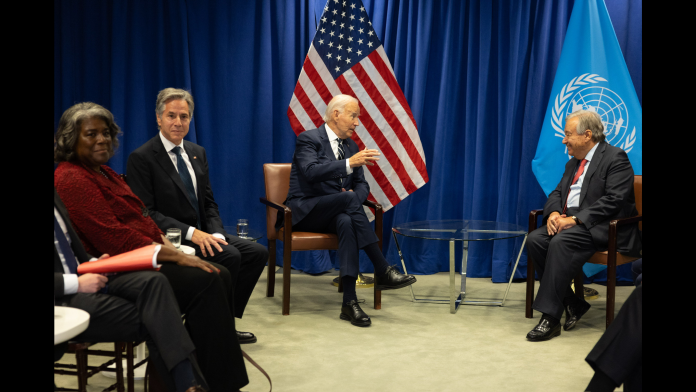This story originally was published by Real Clear Wire
By Carlo J.V. Caro
Real Clear Wire
The Death of Deterrence: How Biden’s Public Signals Are Undermining Global Security
Since April, President Biden’s public assurances—stating that the United States would not join Israel in a military response to the initial Iranian aerial attacks, and more recently his statements that he would not support an Israeli counterattack on Iran’s nuclear infrastructure—mark a critical departure from the core principles of deterrence. Deterrence is not merely about wielding overwhelming force but about creating an environment of uncertainty and fear in the minds of adversaries. Historically, successful deterrence has thrived on ambiguity—the calculated uncertainty that prevents enemies from predicting the consequences of their actions. Yet, under Biden’s administration, this essential principle is eroding through public declarations, particularly toward Iran. This shift threatens to dismantle a carefully maintained balance, with potentially far-reaching consequences for the U.S., Israel, and the global order.
The Middle East, a region historically fraught with sectarian rivalries, territorial disputes, and the constant specter of conflict, has long relied on a delicate balance of power maintained by external actors, primarily the United States. For decades, U.S. ambiguity regarding its military involvement in the region served as a check on Tehran’s nuclear ambitions. This ambiguity kept Iran in a perpetual state of caution, never quite certain how the U.S. or Israel might respond to further nuclear development.
Without the fear of U.S. intervention, Iran faces a clearer path to accelerate its nuclear ambitions and regional powers like Saudi Arabia, Turkey, and Egypt may feel compelled to develop their own nuclear programs, creating a new and highly volatile dynamic in an already unstable region. The breakdown of deterrence here is reminiscent of the fall of ancient empires like Assyria, which failed to recognize the rising threats around them. The collapse of Assyria was not due to military defeat but to complacency in its dominance, allowing adversaries like Babylon to gain strength unchecked. In much the same way, Iran’s ambitions may grow unhindered, pushing the region toward a tipping point.
While Biden’s signaling to Iran presents immediate dangers in the Middle East, its ripple effects extend to global powers like China and Russia. Both nations closely observe U.S. actions in one theater to gauge its resolve in others. China, for instance, has long tested U.S. deterrence, particularly in the South China Sea and regarding Taiwan. Each time the U.S. signals reluctance to engage militarily, Beijing recalibrates its strategy, pushing further into contested waters and escalating its claims over Taiwan. Strategic ambiguity, the cornerstone of Cold War-era deterrence, is being steadily replaced by public assurances of non-involvement. This predictability, far from providing stability, only emboldens aggressors.
Yet, this pattern of erosion in U.S. deterrence is not new. The Obama administration’s failure to enforce the infamous “red line” in Syria signaled to the world that the U.S. was unwilling to commit to its own declarations. This failure emboldened not only Assad but also China and Russia, both of whom saw this as indicative of a broader U.S. reluctance to engage militarily. By the time Russia annexed Crimea in 2014, the pattern of U.S. restraint was firmly established, giving Moscow the confidence to act with impunity. The erosion of U.S. deterrence, therefore, has been a gradual process, one that Biden’s administration is exacerbating through its overly transparent signals of limitation.
History offers numerous lessons on the consequences of telegraphed restraint. One example is the downfall of Carthage during the Punic Wars. While the Second Punic War is most remembered for Hannibal’s military genius, Carthage’s downfall was as much a product of its diplomatic and strategic signals as it was of battlefield defeats. After Hannibal’s victories in Italy, Carthage adopted a policy of restraint, signaling to Rome its reluctance to engage in full-scale retaliation. This hesitation was perceived as weakness by the Romans, who regrouped and ultimately destroyed Carthage. Had Carthage maintained a policy of strategic ambiguity, its fate may have been dramatically different. The lesson is clear: public declarations of restraint only serve to embolden adversaries.
Napoleon, one of history’s most brilliant military minds, offers another instructive case. Napoleon understood that the key to deterrence was unpredictability. During his campaign in Italy in 1796, Napoleon masterfully manipulated his enemies by allowing false reports to circulate about his plans. This ambiguity forced his adversaries to spread their forces thin, unsure of where the next blow would land. By maintaining a shroud of uncertainty, Napoleon struck with devastating precision, turning ambiguity into his most potent weapon.
Machiavelli, in The Discourses, emphasized the importance of unpredictability in statecraft. He warned that rulers who signal their limitations too openly invite exploitation by their adversaries. Much like Machiavelli’s cautionary advice, Biden’s public assurances reveal America’s strategic limits, inviting aggression from those who seek to exploit American restraint.
Thomas Schelling emphasized the importance of the “threat that leaves something to chance.” Schelling’s insight was that deterrence works most effectively when adversaries are uncertain about the full range of possible consequences. A clear, predictable threat can be calculated and potentially countered. But a threat that leaves open the possibility of uncontrolled escalation forces adversaries to consider the worst-case scenario, preventing them from taking aggressive actions. During the Cold War, it was this very concept of unpredictability that prevented nuclear conflict between the U.S. and the Soviet Union. Neither side could be entirely sure what the other might do in a moment of crisis, and this mutual uncertainty maintained a fragile peace.
Chinese geopolitical strategy draws heavily from the game of wei qi—a strategic exercise of encirclement and calculated ambiguity. Unlike chess, where the objective is visible from the outset, wei qi emphasizes gradual control through subtle, unpredictable maneuvers designed to surround and outmaneuver the opponent. Each time the U.S. signals hesitation or reluctance to engage militarily, China interprets it as an opportunity to advance its strategic aims, much like the deliberate encirclement in wei qi.
Perhaps one of the most original and effective practitioners of deterrence in history was Genghis Khan. While his name is often associated with brutality, it was the calculated ambiguity of his actions that paralyzed entire civilizations before they were even conquered. Genghis Khan famously offered two options to his enemies: surrender and live, or resist and be annihilated. However, he never revealed the true extent of his wrath until it was too late. This uncertainty about what the Mongols might do next created a psychological advantage that allowed them to conquer vast territories with minimal resistance. Some cities surrendered without a fight, terrified by the prospect of Mongol retribution, while others gambled and were obliterated.
The brilliance of Genghis Khan’s deterrence was in keeping his enemies in a perpetual state of fear—not knowing when or how he might strike. This historical lesson highlights the power of unpredictability in maintaining control over adversaries. Biden’s clear signaling to Iran does the exact opposite.
The U.S. must adopt a similar approach, ensuring that adversaries like Iran, China, and Russia are left in a state of perpetual doubt regarding American intentions. Without this uncertainty, the U.S. risks losing its grip on global stability, with consequences that could echo across generations.
Carlo J.V. Caro has a postgraduate degree in Islamic Studies from Columbia University and is a political and military analyst. He has published numerous articles in the US and Israel on foreign affairs and security.
The post The Death of Deterrence appeared first on The Gateway Pundit.
This article may have been paraphrased or summarized for brevity. The original article may be accessed here: Read Source Article.









